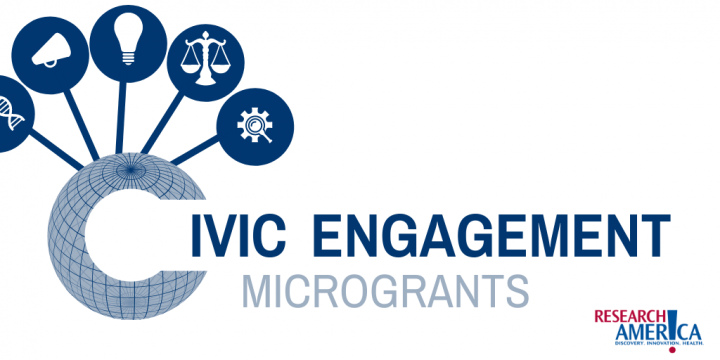Graduate Student Groups From 15 States Awarded Microgrants For Science Policy Initiatives to Engage Community And Public Officials

Research!America and the Rita Allen Foundation are pleased to announce the recipients of the 2021 Civic Engagement Microgrant Initiative. Now in its third year, the microgrant program provides funding to graduate student and postdoc-led science policy groups from across the U.S. to develop and lead outreach activities in their local communities.
The 2021 Civic Engagement Microgrant Initiative is providing funding for 19 groups whose projects include podcasts, roundtable discussions, data visualization projects, and policy-orientated science fairs. Four grants will be used to start up new groups. All activities will be conducted virtually due to the COVID-19 pandemic. Nearly 50 applications were received, a 50% increase from last year. The program is supported by a grant from the Rita Allen Foundation.
“Surveys commissioned by Research!America consistently show that the public strongly believes scientists should inform them about their research and its impact on society,” said Mary Woolley, President and Chief Executive Officer of Research!America. “Supporting our nation’s early-career scientists to engage with their local communities is a crucial and exciting step forward. We are grateful for the support from the Rita Allen Foundation and thank the many student groups who shared their innovative ideas.”
“Over the years of our partnership with Research!America and the microgrants program, we have been deeply encouraged to see new civic science connections led by early-career scientists,” said Elizabeth Good Christopherson, President and Chief Executive Officer of the Rita Allen Foundation. “In a year that, more than ever, our country is urgently addressing complex problems rooted in science, technology, and societal dynamics, these new problem-solving teams are developing much-needed partnerships with the diverse communities where they have their roots.”
Research!America microgrants were awarded to graduate student groups affiliated with the following academic institutions and organizations: American Physician Scientists Association; Baylor College of Medicine; Boston University; the Medical University of South Carolina; Morgan State University; Stanford University; The Ohio State University College of Medicine; The Rockefeller University, Weill Cornell Medicine Center, and Memorial Sloan Kettering Cancer Center; University of California, Irvine; University of California, San Diego; University of Georgia; University of Massachusetts, Amherst; University of Michigan; University of Missouri; University of Nebraska Medical Center; University of Pittsburgh School of Medicine; University of South Florida College of Public Health; Virginia Polytechnic Institute and State University; and Yale University School of Medicine.
Examples of projects include: Baylor College of Medicine students utilizing data visualization techniques to present scientific information of interest to the community in a compelling way; a new group at Morgan State University will address topics of importance to under-represented minorities locally and also engage with high school science clubs; students at the University of Pittsburgh School of Medicine plan to work in local neighborhoods to promote the importance of vaccinations, aptly calling themselves the “The Influenzers.” Information about all 19 grantee groups is on this webpage.
For more information, visit the Research!America website.
The Research!America alliance advocates for science, discovery, and innovation to achieve better health for all.
The Rita Allen Foundation invests in transformative ideas in their earliest stages to leverage their growth and promote breakthrough solutions to significant problems. It enables early-career biomedical scholars to do pioneering research, seeds innovative approaches to fostering informed civic engagement, and develops knowledge and networks to build the effectiveness of the philanthropic sector.
CONTACT:
571-482-2737




